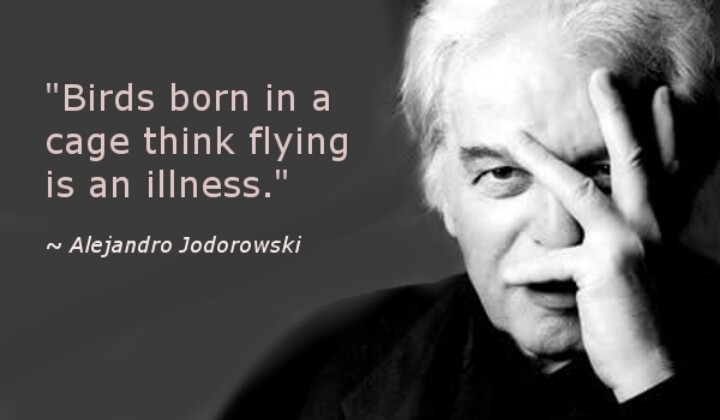In the 18th century, the great thinkers of the Age of Enlightenment envisioned a world in which people are guided by reason, science and the pursuit of truth.
Although, since then, we’ve made significant progress in that direction, even today, many people fall prey to naive views and superstitions, as a result of indoctrination.
Indoctrination – the process of teaching others to accept a set of belief uncritically – is still prevalent today. It can come from families, communities, governments, churches or the old and new media. It is often done in a sturdy, sneaky and strategic manner, and it has a big impact.
So no matter your age or your country, it’s important to be well equipped to protect yourself against indoctrination. For this reason, based on my communication coaching experience and my psychology knowledge, I wanna share with you several effective ways to fight off any and all attempts of indoctrination.
1. Ask For Evidence
People around you will make all sorts of claims, and just expect you to accept them as true, simply because they made them. Unfortunately, many of us are conditioned from a young age to do just that: accept whatever others claim, as if they always know better than us.
You wanna reverse this tendency. And the way to do this is by getting used to regularly questioning the accuracy of people’s claims, and, when you have reasons to doubt it, asking them for evidence that supports them. If they fail to provide good evidence (which they will often do), then you have no good reason to believe their claims.
2. Reject Faith-Based Beliefs
When pressed for evidence for their claims, many folks will often invoke faith. They’ll say you just have to have faith that what they state is true, implying that faith is a virtue.
But faith is not a virtue, and I see no good reason to see it as one. Essentially, as philosophy and critical thinking professor Peter Boghossian puts it, faith means pretending to know things you don’t know.
Indeed, faith is not a true, reliable way to obtain accurate knowledge about the world, only to imagine you have that knowledge. So whenever somebody asks you to believe something based of faith, I suggest you refuse to do so and keep asking for evidence.
3. Study the Opposing View
Sometimes, people will provide some proof for their claims. Many times though, the proof will only seem convincing until you read or hear the evidence of the opposing side as well.
This is why, when deciding on an issue, it’s crucial to study both sides of the argument, drawing your information from knowledgeable and credible sources, before making up your mind.
 For example: I recently learned about a supposed method to predict market trends and make good financial investments, based on something called Kondratiev waves.
For example: I recently learned about a supposed method to predict market trends and make good financial investments, based on something called Kondratiev waves.
The method seemed solid initially, until I looked up what the skeptics have to say about it. I found their counterarguments to be even more solid, and thus my trust in K-waves predictions never truly developed. Rightfully, I’d say.
4. Be Wary of Persuasion by Repetition
Indoctrination often relies on the persistent repetition, over and over again, of the same unproven claims.
Unfortunately, this approach does seem to work fairly well. There are quite a few psychological studies that show the simple repetition of a message, without the addition of new arguments to it, does make it feel more believable over time. Call it a glitch in how we humans process information.
To protect yourself from this glitch, you need to pay attention to messages you hear or read over and over again, and remind yourself that mere repetition does not change an idea’s truth value. Keep yourself vigilant to and cautions of attempts at persuasion by repetition.
5. Be Wary of Appeals to Popularity
Another common indoctrination tactic is the appeal to popularity (aka appeal to majority). This is when somebody tries to make an idea seem true by invoking the large number of people who believe it. Involuntarily, we are frequently tempted to give an idea credence just because it’s commonly believed, or to cave in to social pressure and adopt the beliefs of the majority.
Again, awareness of this tendency is the best way to resist it. Bear in mind that the mass appeal of an idea is not in any way a good indicator of the accuracy of that idea. So many times, the majority has bought into really dumb ideas.
Also, work on improving your social confidence, to be better able to resist any form of social pressure. Check out this instructional video I created to learn how to develop your social confidence effectively, using my proven cognitive-behavioral strategy.
6. Practice Sound Reasoning
Ultimately, the best tool for protecting yourself against indoctrination is your ability to practice sound reasoning and critical thinking. It allows you to exorcise any bad ideas you’ve held so far, and it creates a thick barrier against other bad ideas coming in.
You develop your ability for sound reasoning by studying logic, learning about the scientific method, understanding the principles of proper reasoning, and putting this into practice in your day to day life, as you get exposed to a variety of ideas and you reflect on them.
In today’s fast paced world, in which we get exposed to heaps of information every single day, it’s not easy to take the time to research incoming data properly, to analyze it critically and to reject it if proven false or unsubstantiated.
But this is the only way to defend yourself against indoctrination and stay in charge of your own beliefs. By staying in charge of your own beliefs, you stay in charge of your own decisions. And by staying in charge of your own decisions, you stay in charge of your own life.
For more help on developing rational thinking skills and improving your impact in communication please join me on my free social success newsletter.
 Based on these two distinct mindsets, you can deduce some of the differences between confidence and arrogance yourself, as they manifest in people’s behavior.
Based on these two distinct mindsets, you can deduce some of the differences between confidence and arrogance yourself, as they manifest in people’s behavior. For instance,
For instance, 
 In fact, most
In fact, most 
 Second of all, it’s worth mentioning that you can’t really fake social confidence. Shy and socially anxious people would like to believe that they can just act as if they’re not shy, and that will quickly fix how they come across, without the need to address the deeper issue. But that doesn’t really work.
Second of all, it’s worth mentioning that you can’t really fake social confidence. Shy and socially anxious people would like to believe that they can just act as if they’re not shy, and that will quickly fix how they come across, without the need to address the deeper issue. But that doesn’t really work. However, the vast majority of times, social pressure takes light and brief forms. Like if your friends
However, the vast majority of times, social pressure takes light and brief forms. Like if your friends  This doesn’t mean you can’t concern yourself with the happiness of others as well. In fact, often in life, you need to give others what they want and make them happier in order to get what you want and be happier yourself.
This doesn’t mean you can’t concern yourself with the happiness of others as well. In fact, often in life, you need to give others what they want and make them happier in order to get what you want and be happier yourself.